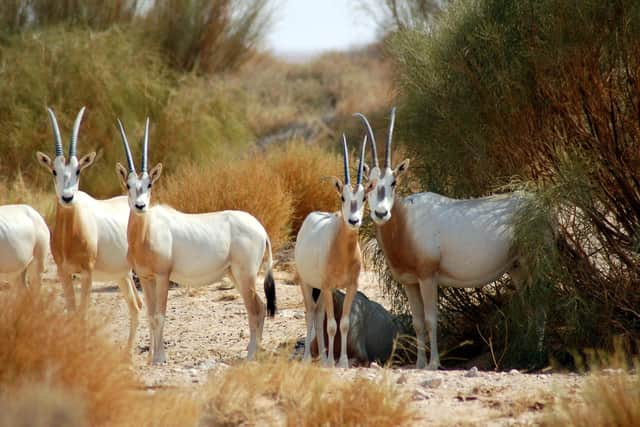Marwell Zoo: Hampshire zoo celebrates conservation efforts to save scimitar-horned oryx from extinction
and live on Freeview channel 276
Once common across North Africa, scimitar-horned oryx disappeared from the wild by the end of the 1990’s due to over-hunting and prolonged droughts.
Advertisement
Hide AdAdvertisement
Hide AdAfter extinction across its global range, the scimitar-horned oryx is now re-established in the wild and its fate has been reversed.


The IUCN Red List downlisting recognises the self-sustaining population of scimitar-horned oryx of over 600 animals, which now thrives within Chad’s Ouadi Rimé-Ouadi Achim Faunal Reserve. The project was led by the Environment Agency-Abu Dhabi and the Chad Government and implemented on the ground by Sahara Conservation, along with international partners.
Dr Tania Gilbert, Head of Conservation Science at Marwell Wildlife, said: “The change in status of scimitar-horned oryx from Extinct in the Wild to Endangered is a testament to the power of collaborative conservation action, and gives us all hope that we are able to make a real difference and restore nature.
SEE ALSO: University of Portsmouth to work in partnership with King's College London to offer medical degree
“The species is still at risk from extinction (Endangered), but the conservation work in Chad, Tunisia, Morocco and Senegal greatly reduces this risk and has given the species a real chance of recovery.”
Advertisement
Hide AdAdvertisement
Hide AdMarwell collected a genetically diverse group of oryx from across European zoos, including Marwell, and transferred them to the Environment Agency-Abu Dhabi (EAD) to increase the genetic diversity of the source population for the reintroduction to Chad.
Genetic diversity is crucial to establishing a sustainable population as it enables a population to adapt to changing environmental conditions.
The Hampshire conservation charity was also part of the team modelling the release strategy at a workshop in Abu Dhabi in 2012 when plans for the project were being developed.
Since 2011, Marwell has its own expert team based in Tunisia, who work with local communities to give local park rangers, vets and students the skills, knowledge and resources they need to ensure threatened species have a much brighter future.